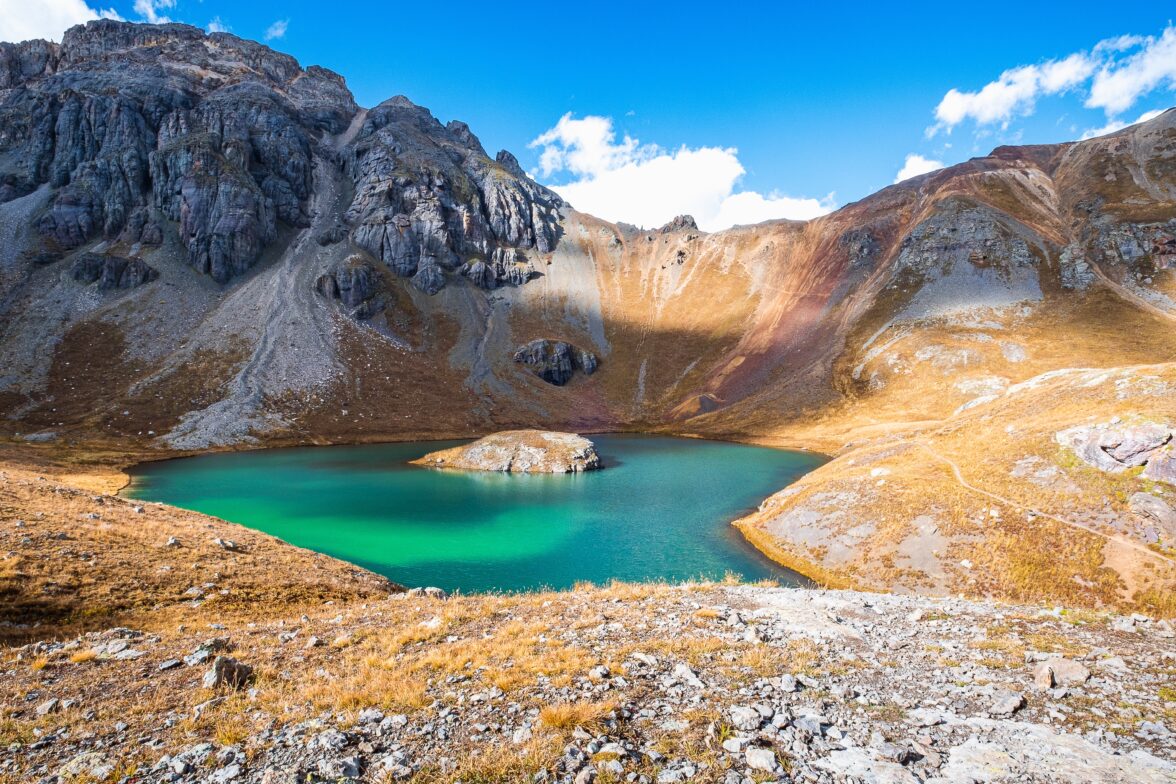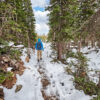Summer is here! The snow has finally melted out of Colorado’s high alpine, offering endless opportunities to explore some of the most beautiful places in the world and enjoy meadows bathed in a sea of wildflowers.
While pretty much any Centennial State hike is a gem during the warm months, some truly stand out. That’s why we put together this list of the best hikes in Colorado for the summer, from easy spots near Denver to scenic routes that are very much worth a road trip.
As a bonus, we even have a reminder about what to bring hiking in Colorado, since you definitely don’t want to ruin your summer by being in the news.
Check out our full roundup below, and enjoy all of your Colorado summer adventures!
Jump to:
- Within 30 Minutes of Denver
- Within an Hour of Denver
- Within 2 Hours of Denver
- If You’re Up for a Road Trip
- What to Bring Hiking in Colorado
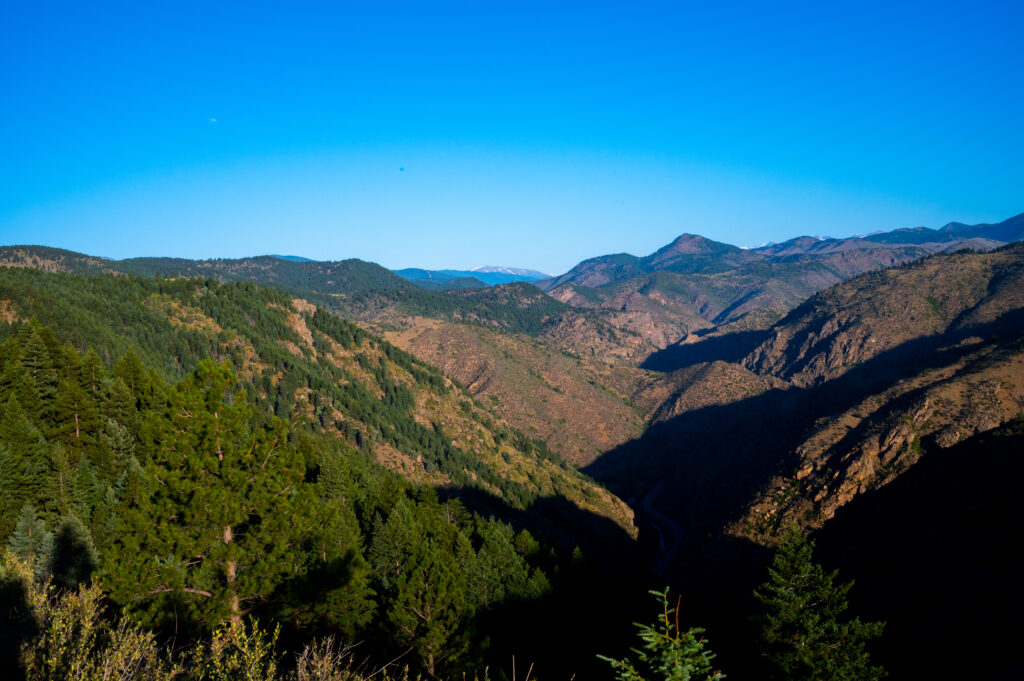
The Best Hikes in Colorado in Summer Within 30 Minutes of Denver
Chimney Gulch and Lookout Mountain Trail
Golden
- Difficulty: Hard
- Length: Just under 7 miles with more than 1,700 feet of elevation gain
- Distance from Denver: 24 minutes
Sure, you can just drive up Lookout Mountain, but that means you’re missing one of the most epic hikes in Golden, Colorado. Also, summer is fourteener season, and this is the perfect spot in Denver to train for the state’s highest peaks. The Chimney Gulch Trail starts off US 6 at the base of Lookout Mountain and just keeps climbing until you reach the top of this iconic landmark. From there, you can either turn around or connect the trail to Apex Park if you’re looking to get more miles in. No matter what, be sure to give at least one judgmental glare to the people with the audacity to just drive up this epic hiking route.
Matthews/Winter Park
Morrison
- Difficulty: Moderate
- Length: 5 miles if you loop the Red Rocks Trail, Morrison Slide Trail, Cherry Gulch, and Village Walk
- Distance from Denver: 20 minutes
If you want to introduce someone from out of town to hiking in Denver, Colorado, this one definitely checks off a bunch of the boxes. To start, it’s close to Red Rocks, which is reason alone to make the trek down Interstate 70 to this cool set of trails, which, again, are very close to Denver, Colorado. Secondly, it provides a challenge, but it’s not so hard that a lowlander will be gasping for breath and refuse to ever hike with you again. Thirdly, the trailhead is near a creek — which is clutch for cooling off during the summer. Finally, the Morrison Slide trail provides profile pic-worthy views of the Hogback, epic red rock formations, and the surrounding foothills. Once the hike is over, you can reward yourself with a beer in nearby Morrison.
Meyer Ranch Park
Conifer
- Difficulty: Moderate
- Length: 4.1 total trail miles if you hit all the loops
- Distance from Denver: 30 minutes
During the summer, hiking in Denver, Colorado, can get very hot and exposed — which is why it’s an excellent call to head west if you can. And while this county park doesn’t have a ton of trail miles, it makes up for it with something you’ll very much appreciate during the hottest part of the year: plenty of shade. This park’s trails wind through a gorgeous forest that feels very far away from the city (even though it’s really pretty close). And if you make it to the Old Ski Run Trail at the top (which we highly recommend), you’ll be rewarded with scenic views of the Continental Divide and lots of nearby rock formations.
South Table Mountain Park
Golden
- Difficulty: Moderate
- Length: Choose your own adventure. We recommend the 5-mile loop from the Golden Hills Road trailhead to the town’s famous Castle Rock landmark.
- Distance from Denver: 20 minutes
This county park happens to have one of the quintessential hikes in Golden, Colorado — and it’s at its very best during the summer, when the wildflowers give the mesa top a burst of color. There are multiple ways to enjoy South Table Mountain, but we’re big fans of starting at the Golden Hills Road trailhead, taking the Fossil Trail to the mesa top, and then heading west toward Castle Rock — the landmark that happens to grace some iterations of the Coors logo. This hike doesn’t have a ton of elevation gain — around 400 feet — but it’s exposed, so bring plenty of water, a hat, and sunscreen. When it comes to trails in Denver, Colorado, you’ll keep coming back to this one regardless of the season.
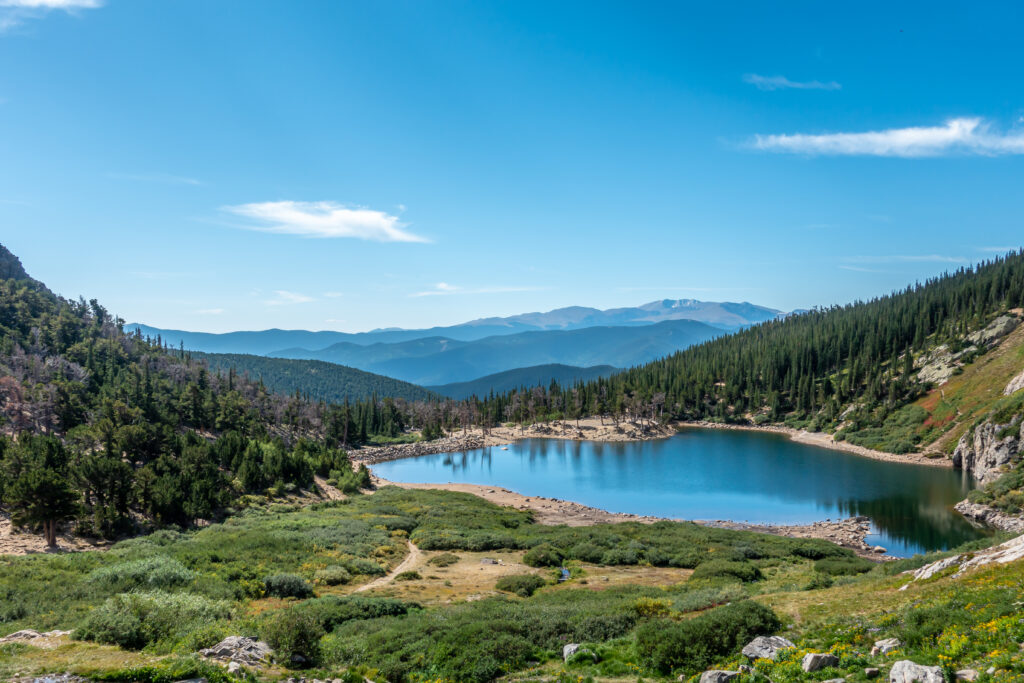
The Best Hikes in Colorado in Summer Within an Hour of Denver
Elk Falls in Staunton State Park
Conifer
- Difficulty: Moderate
- Length: 8 miles
- Distance from Denver: 45 minutes
This is easily one of the best hikes in Colorado — and as an added bonus, it’s pretty close to Denver! Staunton State Park has no shortage of fun loops with stunning views of the Platte River Valley down to Pikes Peak, but it also has a pretty epic waterfall. To get there, park in the Lazy V lot and follow the Staunton Ranch Trail to the Bugling Elk and Chimney Rock Trails. Along the way, you’ll see the super cool Lions Head rock formation and have the chance to cool off at a small pond. You’ll descend some fairly steep switchbacks into Elk Falls, but hearing the roaring waterfall and seeing the views down the valley make it more than worth it. As you can imagine, this hike can get busy, so arrive early or try to do it on a weekday if you can.
Pulpit Rock Park Loop
Colorado Springs
- Difficulty: Moderate
- Length: 5.1 miles
- Distance from Denver: 1 hour
This scenic and moderately challenging loop trail is definitely one of the best hikes in Colorado Springs — and for good reason. Throughout the loop, you’ll catch views of the southern Front Range and climb through the unique formations that make up Pulpit Rock itself. A bonus? You can see Pulpit Rock from I-25, so next time you pass by, you can brag to anyone who will listen that you’ve been to the top!
Spruce Mountain Loop
Larkspur
- Difficulty: Moderate
- Length: 5.3 miles
- Distance from Denver: 55 minutes
During the summer, you might rightfully associate Larkspur with the Renaissance Festival, but it also has one of the best hikes in Colorado Springs (or at least the general area). Spruce Mountain is visible from I-25, and this cool 5-mile loop in the Greenland area offers a fairly decent climb followed by nice views of Rampart Range and beyond, as well as some unique rock formations. There’s also a fair amount of shade, making it a good Colorado trail option for the summer. Once you have your workout in, definitely stop by the Renaissance Festival for a turkey leg. You need the protein!
St. Mary’s Glacier
Georgetown
- Difficulty: Easy
- Length: 1.7 miles
- Distance from Denver: 1 hour
If summer in Denver has you desperate to see some snow, this hike has exactly what you need. St. Mary’s Glacier isn’t one of the hardest — or under the radar — hikes in Colorado, but there’s a reason why people keep coming back again and again. During this relatively short out-and-back journey, you not only get access to a gorgeous alpine lake (a perfect spot to cool off in its own right), but also a glacier — where you should have the opportunity to actually catch some snow during the hottest part of the year. Be sure to pack a lunch, bring a comfy blanket and some chairs, and post up in this spot that might make you forget how hot it is down in the city.
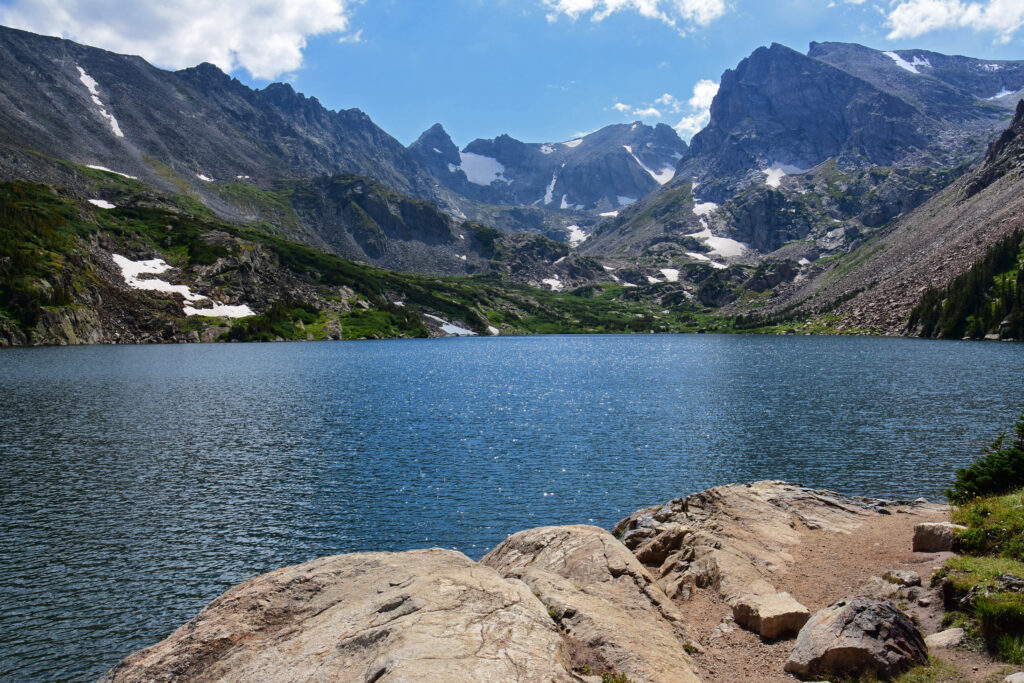
Where to Hike in Colorado in Summer Within 2 Hours of Denver
Booth Lake Trail
Vail
- Difficulty: Moderate
- Length: 4.5 miles (one way), 1,328 feet of elevation gain
- Distance from Denver: A little more than 1.5 hours
The Vail Valley is home to some of the best hikes in Colorado, and this one might be a top option during the summer. That’s because it follows Booth Creek through stunning aspen groves for much of the beginning half before leveling off and taking adventurers through meadows filled with wildflowers and, finally, a waterfall. Keep going to Booth Lake, where — even though the trail itself can get rocky and hard — you’ll be rewarded with amazing views of the rocky peaks of the Gore Range.
Harvard Lakes Trail
Buena Vista
- Difficulty: Moderate
- Length: 5 miles, 1,500 feet of elevation gain
- Distance from Denver: About 2 hours
While it’s near two gorgeous fourteeners (Mt. Harvard and Columbia, if you’re keeping track), these alpine lakes are worth the journey on their own. This trail follows the east side of Mt. Columbia before hooking up with the Colorado Trail, where you’ll find two alpine lakes against a scenic backdrop, offering the perfect reprieve from the summer heat. Be sure to make a stop in Buena Vista on your way back to Denver — it’s one of the coolest mountain towns in the state and a great place to snag pizza and a beer.
Lake Isabelle
Nederland
- Difficulty: Moderate
- Length: 6.6 miles, about 700 feet of elevation gain
- Distance from Denver: A little less than 1.5 hours
Looking for a high alpine experience relatively close to Denver and Boulder? This route in the Indian Peaks Wilderness Area is definitely the hike for you. Start at the Brainard Lake trailhead and wind through conifers, meadows, streams, and even cool wooden walkways as you make your way to multiple alpine lakes, ending with the grand finale: Lake Isabelle. High peaks on each side surround this stunning, high-altitude body of water. If the weather’s good, eat a picnic on the boulder and soak in the views before making your way back to the trailhead.
McCullough Gulch Trail
Breckenridge
- Difficulty: Moderate
- Length: 6.4 miles with 1,400 feet of elevation gain
- Distance from Denver: 1 hour, 45 minutes
This Colorado trail has pretty much everything you can want out of a summer hike, from the potential to see mountain goats to meadows full of wildflowers to a waterfall to stunning alpine lakes. The ascent is gradual, but it gets rocky, so it’s not necessarily for the faint of heart. If you make it to the upper lakes, you’ll have to follow cairns rather than an established trail, but it’s worth it for the high alpine experience that only really happens during Colorado summer. Because this trail is so close to Breckenridge, parking is by reservation only, but you can also catch a shuttle from downtown.
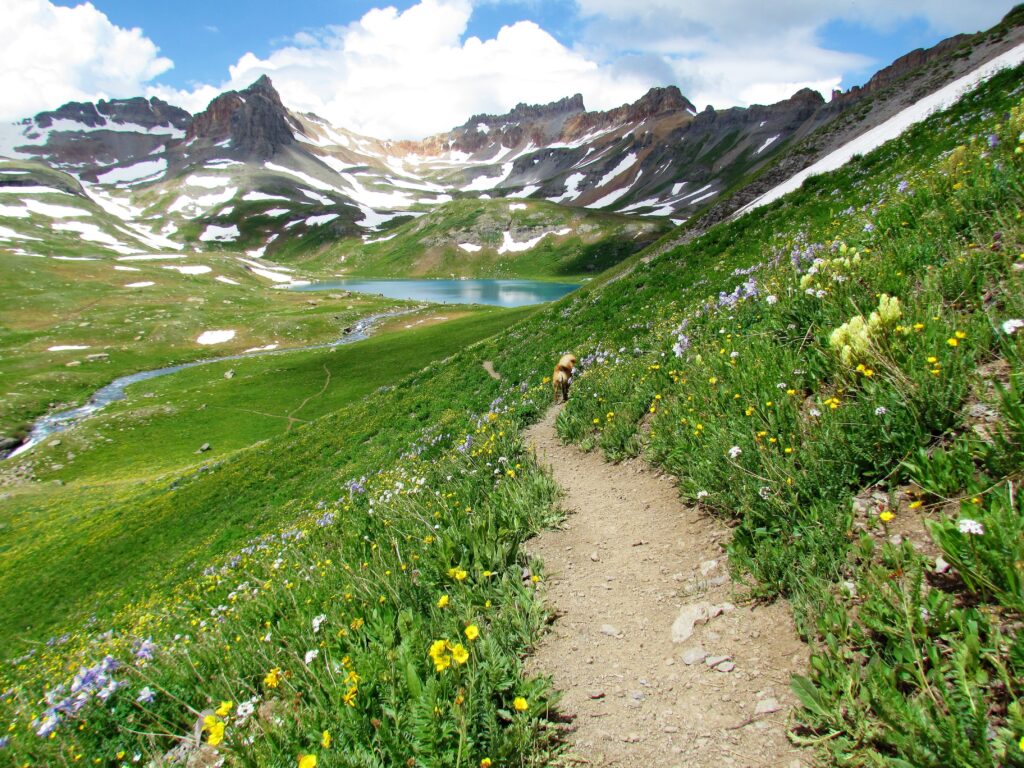
Where to Hike in Colorado in Summer if You’re Up for a Road Trip
Ice Lake Trail
Silverton
- Difficulty: Hard
- Length: 7.5 miles roundtrip with almost 3,000 feet of elevation
- Distance from Denver: 6.5 hours
This might be one of the most popular (and frequently photographed) non-fourteener trails in Colorado, but there’s a good reason for it: It’s absolutely stunning. The first half of this route starts below the timberline and continuously ascends to Lower Ice Lake, which is surrounded by a stunning ridgeline and meadows that, during the summer, are dotted with wildflowers.
Definitely take a break and soak in the views here, and then keep going above the treeline to the upper lake, which is surrounded by three stunning lakes. Like we said, this is popular, so get to the trailhead as early as you can, and definitely consider doing this on a weekday if you can pull it off. With that being said, it’s worth it.
Red Lady via Scarp Ridge
Crested Butte
- Difficulty: Hard
- Length: 8 miles
- Distance from Denver: 4 hours, 45 minutes
Crested Butte has some of the best hikes in Colorado, period, and they’re probably at their best during their summer. That’s thanks to this stunning region’s even more stunning wildflowers, and this trail offers opportunities to see them dot the hillsides in spades — as well as a summit view showcasing the epicness of all the surrounding mountains (can you tell we’re big fans of Crested Butte here?). The hike begins in a meadow full of wildflowers and climbs toward a ridgeline, where you’ll be rewarded with views of Upper Peeler Lakes and Oh Be Joyful Valley. As you climb to the Red Lady itself, you’ll be greeted with prayer flags and 360-degree views that include Mt. Crested Butte. This might become your favorite Colorado trail.
Sunnyside Trail
Aspen
- Difficulty: Hard
- Length: 11.5 miles
- Distance from Denver: 3.5 hours
While most people associate Aspen with luxury shops and celebrity visitors, it also happens to be nestled in one of the most beautiful valleys in Colorado. While the Maroon Bells rightfully get a lot of the love, this hike shows that the region has even more to offer. This route climbs more than 2,700 feet of elevation as it makes its way through the Roaring Fork Valley, with opportunities to cool off in the Roaring Fork River. Be sure to take plenty of pictures of the vistas of the nearby ski areas and Mt. Sopris, and don’t forget to stop and enjoy the wildflowers. If you’re thinking about where to hike in Colorado in summer, this one is hard to beat.
Warner Route
Black Canyon of the Gunnison National Park
- Difficulty: Hard
- Length: 4.3 miles one way
- Distance from Denver: About 5 hours
Just visiting the rim of the Black Canyon of the Gunnison is daunting enough but c’mon, you’re from Colorado! You’re up for a challenge! This trail definitely qualifies. The Warner Route requires a backcountry pass (snag one from the ranger station) and makes its way 3,000 feet down this stunning canyon to the Gunnison River below. Bring your fishing pole (and license), since this is a gold medal fishery. Plus, if you plan ahead, you can even snag a backcountry camping permit. If not, the hard part awaits for the second half of the climb as you huff and puff your way back to the rim. Is this hike easy? No, but none of the best hikes in Colorado are, so enjoy the journey.
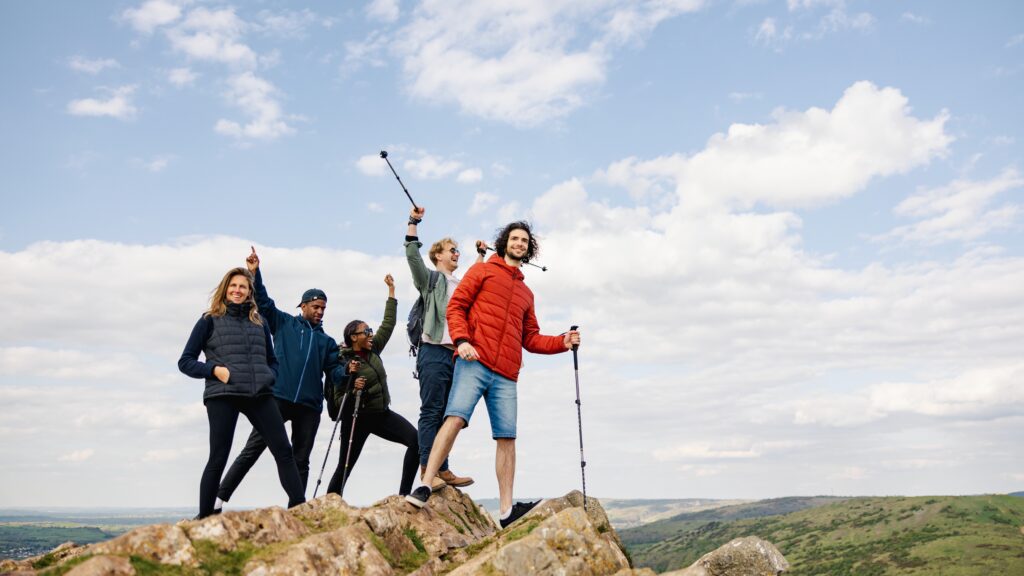
Bonus: What to Bring Hiking in Colorado
Like any season in Colorado, summer can be unpredictable — meaning it’s definitely not a good call to be stuck in the wilderness in just shorts and flip-flops. Be sure to bring plenty of water and lots of sunscreen to protect against those high-altitude UV rays, and even invest in sun hats, shirts, and pants.
Like every season, always have the 10 essentials with you before you head out. They are:
- Navigation: This includes maps, GPS, and a compass system.
- Sun protection.
- Insulation: That encompasses warm jackets, rain gear, thermal underwear, hats, and gloves.
- Illumination: Be sure to bring a flashlight or headlamp, even if you plan to get back before the sun sets.
- First aid supplies.
- Emergency matches and a lighter for making a fire.
- A repair kit and tools.
- Plenty of nutrition.
- Water and water treatment supplies.
- An emergency shelter, including a tarp, space blanket, bivy, or even tent.
In addition to gear, make sure to tell someone where you’re going and when you expect to be back. Also, be sure to leave no trace and keep the wilderness as pristine as when you found it.
Happy hiking!


